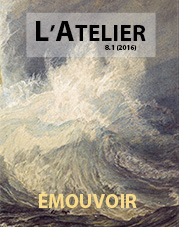L'Émouvante Distanciation dans An Oak Tree de Tim Crouch
Keywords:
Crouch, Tim, émotion, distanciation, métathéâtralité, empathieAbstract
Ce titre sous forme d’oxymore renvoie à une technique récurrente dans le théâtre du dramaturge britannique Tim Crouch qui sera l’objet de cet article, soit comment susciter l’émotion du public par le biais d’une apparente adiaphorie dramatique.
Dans An Oak Tree (2005), un père endeuillé se rend au spectacle de l’hypnotiseur qui a tué sa fille dans un accident de voiture. La particularité de cette pièce consiste à attribuer le rôle du père à un acteur différent chaque soir, celui-ci (ou celle-ci) découvrant le texte au fur et à mesure de la pièce, guidé(e) par Tim Crouch dans le rôle de l’hypnotiseur.
An Oak Tree se caractérise en outre par une constante métathéâtralité qui vient rompre l'illusion dramatique. Crouch sollicite ainsi des techniques de distanciation brechtienne mais l’effet produit est aux antipodes d’une anesthésie émotionnelle. Nous verrons que An Oak Tree, dans sa forme à la fois autoréflexive et antidogmatique, adopte le modèle brechtien tout autant qu’elle s’en détache et parvient à susciter l’émotion par le biais de trois propositions principales : l’émotion est réduite à sa plus simple expression sur l’espace scénique afin de décupler cette émotion chez le spectateur, le principe d’identification au personnage est mis à mal au profit d’autres formes d’empathie et la frontière entre fiction et réalité est brouillée afin de désorienter le spectateur.
The Alienation Affect in Tim Crouch’s An Oak Tree
This oxymoronic title attempts to capture a recurring technique in the plays of British playwright Tim Crouch that has to do with arousing the audience’s emotion by means of apparent detachment.
In An Oak Tree (2005), a bereaved father attends a show of the hypnotist who killed his daughter in a car accident. The play’s specificity lies in its ephemeral cast, since a different actor is chosen to play the part of the father each night, the latter discovering the script as the play opens, guided by Tim Crouch as the hypnotist.
An Oak Tree is moreover characterized by constant metatheatricality which breaks the dramatic illusion. Crouch therefore uses Brechtian distancing effects without, however, depriving his audience of emotional reactions. Both self-reflexive and antidogmatic, Crouch’s An Oak Tree adopts and departs from the Brechtian model and succeeds in arousing the audience’s emotion through three main propositions which consist in reducing this emotion to a minimum on stage (thus intensifying it offstage), preventing the audience from identifying with the character so as to offer other forms of empathy, and blurring the boundary between fiction and reality in order to confuse the audience.
Published
Issue
Section
License
- Work submitted for publication must be original, previously unpublished, and not under consideration for publication elsewhere. If previously published figures, tables, or parts of text are to be included, the copyright-holder's permission must have been obtained prior to submission.
- Authors of accepted manuscripts will assign to L'Atelier the right to electronically distribute their article, or publish it in any form (Internet, CD ROM, printed copy) but authors will retain copyright and, after the article has appeared in L'Atelier, authors may republish their text (in print and/or electronic form) as long as they clearly acknowledge L'Atelier as the original publisher.


